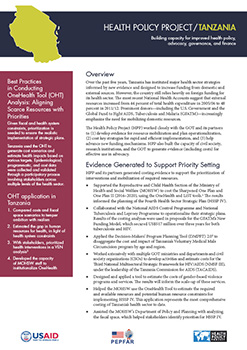The Health Policy Project ended in 2016. Work continued under Health Policy Plus (HP+) until 2022.
Tanzania

Health Policy Project
Country & Regional Programs
- ► Africa
- ► Asia and the Middle East
- ► Europe and Eurasia (E&E)
- ► Latin America and the Caribbean (LAC)
Overview
Over the past decade, Tanzania has made substantial progress in the area of health. Life expectancy has improved and child mortality has declined rapidly. Yet, Tanzania still faces a host of challenges. Many Tanzanians lack access to high-quality health services. Nearly one-in-four women in Tanzania would like to prevent pregnancy, but lack access to family planning (FP). Moreover, the HIV epidemic continues to undermine health and well-being, with the burden falling disproportionately on women and key populations.
To maintain progress toward health and economic goals, Tanzania’s health systems must be strengthened. In today’s restricted funding environment, this requires making the most of existing resources, while exploring innovative ways to improve health financing and mobilize additional resources.
What We Do
The Health Policy Project (HPP) works with partners in Tanzania to strengthen the country’s health systems, combat HIV and gender-based violence (GBV), support implementation of FP2020 commitments, and enhance access to health services for key populations. Our programs assist the Government of Tanzania to identify resource requirements and financing strategies to support development and implementation of key health programs. We provide strategic information to support policy development, while also building institutional and individual capacity to generate and analyze costing data. We also support the use of mapping and spatial analysis to develop a targeted response to the evolving HIV epidemic.
Support Policy Development by Identifying Resource Requirements
Accurately identifying the cost of implementing policies and programs is a key component of improving health financing and enhancing sustainability. HPP works with the Government of Tanzania to identify resource requirements and financing strategies for national HIV, tuberculosis, malaria, and reproductive/child health programs, including GBV and voluntary medical male circumcision (VMMC). Our program also works to build the costing capacity of local partners to enable them to carry out this work independently in the future.
Promote Improved Access to FP/RH Services
The FP2020 initiative, launched at the London FP Summit in 2012, aims to enable 120 million more women and girls to use contraceptives by 2020. HPP is assessing implementation of FP policies in Tanzania to determine the effect of FP2020 commitments on FP policies and programs, and is conducting research on how stigma and discrimination impact adolescents’ access to FP/RH services.
Work to Expand Access to Health Services for Key Populations
In Tanzania, as elsewhere, key populations, including men who have sex with men (MSM) continue to suffer from high levels of stigma and discrimination and limited access to health services. In seven countries, including Tanzania, HPP is providing support to a South Africa-based regional organization African Men for Sexual and Human Rights (AMSHeR) to build the capacity of local advocates and facilitate policy interventions to improve access to healthcare for MSM.
Publications and Resources
Snapshot: Tanzania’s Health System
Prospects for Sustainable Health Financing in Tanzania
Strengthening Tanzania’s Health System: Supporting Priority Interventions to Catalyze Change
Costs and Impacts of Scaling up Voluntary Medical Male Circumcision in Tanzania
Video: "What I Want is Simple"
RAPID, which stands for Resources for the Awareness of Population Impacts on Development, is a computer model that projects the social and economic consequences of rapid population growth for such sectors as labor, education, health, urbanization, and agriculture. It is an advocacy tool to help policymakers and other stakeholders understand the resources and lives that can be saved by investing in family planning.
News
MPs, Donors, and Business Leaders Seek Stable Financing for Tanzania’s Health System
First Lady of Tanzania Urges Women to Use Family Planning without Fear
African Women Leaders Sharpen Advocacy Skills to Expand Family Planning


